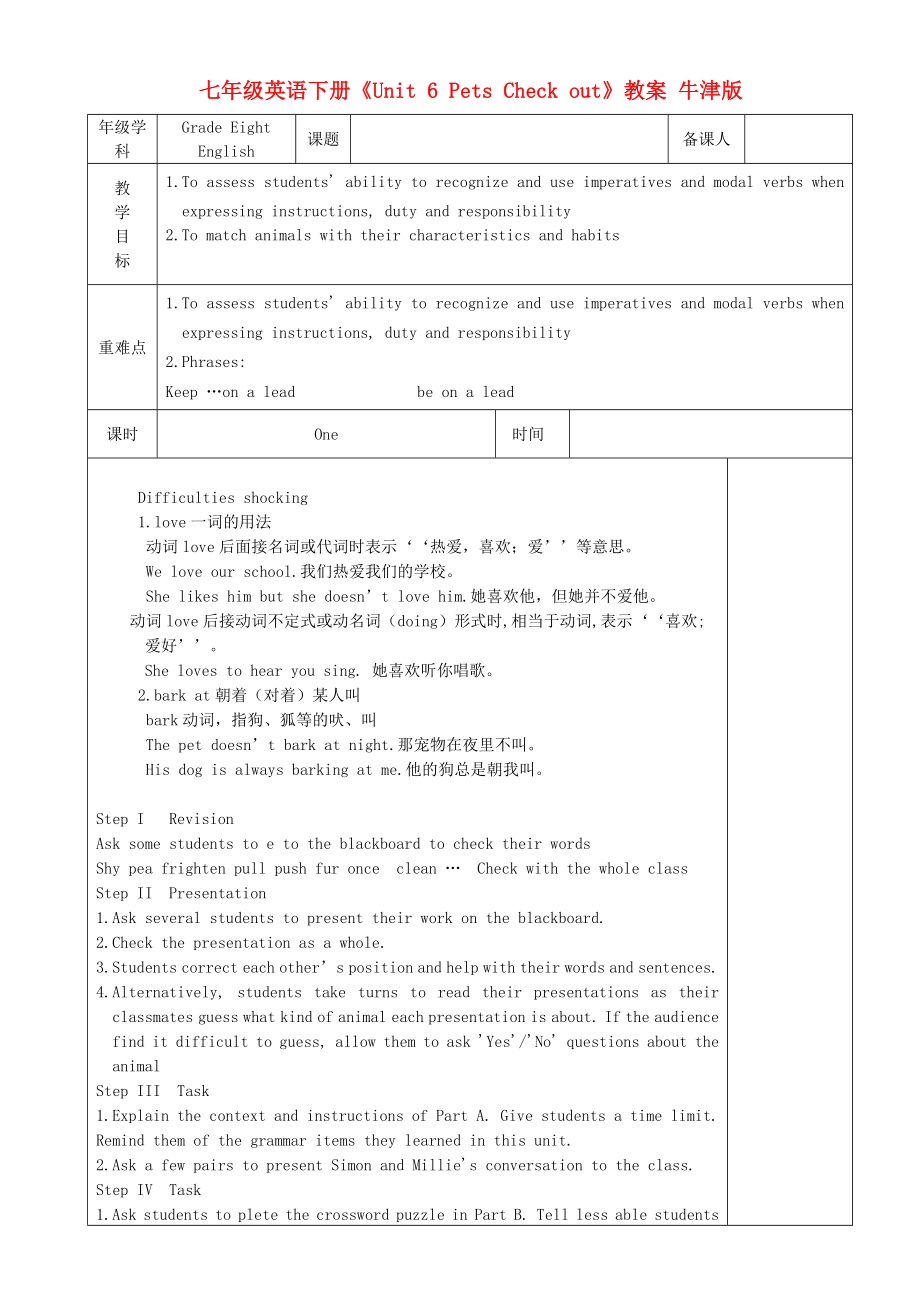《七年級(jí)英語(yǔ)下冊(cè)《Unit 6 Pets Check out》教案 牛津版》由會(huì)員分享���,可在線閱讀�,更多相關(guān)《七年級(jí)英語(yǔ)下冊(cè)《Unit 6 Pets Check out》教案 牛津版(2頁(yè)珍藏版)》請(qǐng)?jiān)谘b配圖網(wǎng)上搜索��。
1����、七年級(jí)英語(yǔ)下冊(cè)《Unit 6 Pets Check out》教案 牛津版
年級(jí)學(xué)科
Grade Eight
English
課題
備課人
教
學(xué)
目
標(biāo)
1.To assess students' ability to recognize and use imperatives and modal verbs when expressing instructions, duty and responsibility
2.To match animals with their characteristics and habits
重難點(diǎn)
1.To assess
2、students' ability to recognize and use imperatives and modal verbs when expressing instructions, duty and responsibility
2.Phrases:
Keep …on a lead be on a lead
課時(shí)
One
時(shí)間
Difficulties shocking
1.love一詞的用法
動(dòng)詞love后面接名詞或代詞時(shí)表示‘‘熱愛(ài)����,喜歡;愛(ài)’’等意思����。
We love our school.我們熱愛(ài)我們的學(xué)校。
S
3�����、he likes him but she doesn’t love him.她喜歡他,但她并不愛(ài)他���。
動(dòng)詞love后接動(dòng)詞不定式或動(dòng)名詞(doing)形式時(shí),相當(dāng)于動(dòng)詞,表示‘‘喜歡;
愛(ài)好’’��。
She loves to hear you sing. 她喜歡聽(tīng)你唱歌��。
2.bark at朝著(對(duì)著)某人叫
bark動(dòng)詞��,指狗��、狐等的吠�、叫
The pet doesn’t bark at night.那寵物在夜里不叫�。
His dog is always barking at me.他的狗總是朝我叫��。
Step I Revision
Ask some stud
4�、ents to e to the blackboard to check their words
Shy pea frighten pull push fur once clean … Check with the whole class
Step II Presentation
1.Ask several students to present their work on the blackboard.
2.Check the presentation as a whole.
3.Students correct each other’s position and help
5、with their words and sentences.
4.Alternatively, students take turns to read their presentations as their classmates guess what kind of animal each presentation is about. If the audience find it difficult to guess, allow them to ask 'Yes'/'No' questions about the animal
Step III Task
1.Explain t
6�、he context and instructions of Part A. Give students a time limit. Remind them of the grammar items they learned in this unit.
2.Ask a few pairs to present Simon and Millie's conversation to the class.
Step IV Task
1.Ask students to plete the crossword puzzle in Part B. Tell less able students t
7、hat they can also refer to the pictures at the bottom of the page for the six kinds of animals.
2.While students are working, walk around the classroom and see if there are any particular problem areas.
3.Students continue making a list of the things they are now able to do in English. Use the stu
8����、dents' learning records developed in Unit 5 and have them assess the progress they have made.
4.The teacher tell students one characteristic about some kinds of animals to let students to guess. If they can’t, tell them more until they guess.
e.g.
It has four legs.
It has a short tail.
It has
9、beautiful fur.
It loves to play with its master.
Step V Games
Students make a crossword puzzle using any of the words introduced in the unit, including
Step VI Exercises
Ⅰ. 用所給動(dòng)詞的適當(dāng)形式填空����。
1.My pet is very easy________(look) after.
2.He mustn’t_________(sleep) a lot every day.
3.What abou
10�����、t __________(eat) mooncakes?
4.Lucy, _________(not play) with balls and sticks.
5.She _________(not like) being on a lead.
Ⅱ.句型轉(zhuǎn)換�����。
1 The fish lives in a tank.(否定句)
The fish______ _______in a tank.
2. I eat many vegetables.(同義句)
I eat _______ _______ ________ / ________ ________ v
11�、egetables.
3. I like fish best.(同義句)
_______ _______food is fish.
4.You mustn’t play with balls.(同義句)
________ ________ with balls .
5. I usually sit on the bed.(疑問(wèn)句)
________ you usually ________sit on the bed?
It has four legs.
It has a short tail.
It has beautiful fur.
板書(shū)設(shè)計(jì)
教學(xué)反思
 七年級(jí)英語(yǔ)下冊(cè)《Unit 6 Pets Check out》教案 牛津版
七年級(jí)英語(yǔ)下冊(cè)《Unit 6 Pets Check out》教案 牛津版

